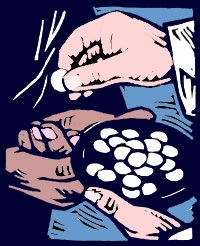
20th Sunday in Ordinary Time Year B
In today’s gospel reading Jesus concludes his teaching on the mystery of the Eucharist. We hear again the announcing of the Eucharist as the ultimate expression of the Incarnation: ‘The bread that I shall give is my flesh, for the life of the world’. The listeners find this hard to accept, giving expression to the challenge all believers face as they own the truth of Jesus’ words. The forthright response of Jesus to these doubts is a support and confirmation for our faith: through his Paschal Mystery he has truly become the healing and nourishment of the world, and he gives an ultimate expression to this fact by becoming our sacramental food and drink. Jesus is insistent: ‘My flesh is real food and my body is real drink’; and the words he uses for ‘eating’ and ‘drinking’ in the gospel text have a graphic realism, confirming what he has said.
The Eucharistic mystery, whereby the Saviour makes himself - in the achievement of his Paschal Mystery - our very nourishment, is realised in a meal (‘Do this’ Jesus says). The first reading takes up the banquet theme. A celebratory meal shared with friends is one of the most meaningful moments of our human experience. Wisdom, the personification of God’s ways in the world, calls those who are lost to share in her banquet. Now Jesus, who is the very Wisdom of God in person, calls us to his table.
And what does the nourishment of this meal bring to those who respond to the Lord’s invitation? Nothing less than a sharing in the divine life that unites Father, Son and Holy Spirit. In the same gospel, at the Supper, the prayer of Jesus to the Father will be: ‘All I have is yours and all you have is mine, and in them [my disciples] I am glorified’ (17:10; see also v.21). In this discourse Jesus emphatically links this sharing in the divine life with the Eucharist: ‘As I draw life from the Father, so whoever eats me will draw life from me’. And the joy of that life will never end: ‘Anyone who eats my flesh has eternal life and I shall raise him up on the last day’.
Paul’s teaching in the reading from Ephesians gives us a glimpse of the Eucharistic liturgies of the first Christian communities. As they gather to celebrate what God has done for them in Christ, they give expression to their wonder in ‘the words and tunes of the psalms and hymns’. And when they return to their daily lives they take this faith and enthusiasm with them as they ‘go on singing and chanting to the Lord in their hearts’. Their central prayer is one of gratitude ‘always and everywhere they give thanks to God’. ‘Eucharist’ we know means ‘Thanksgiving’ – the Church’s principal act of worship is a grateful response to the God who ‘loved us first’. Our prayer is to the Father, ‘in the name of our Lord Jesus Christ’; because the Saviour has made himself our way to the Father. The people of their time, Paul tells them, have lost their way. Their life of witness and their prayer will be used by God to ‘redeem’ such people. We who are called to the Lord’s table have a great responsibility – in eternal life we shall see how important in the designs of God are our heartfelt Prayers of the Faithful as we have bring the needs of the human family in faith and love to the Father.
John Thornhill sm

